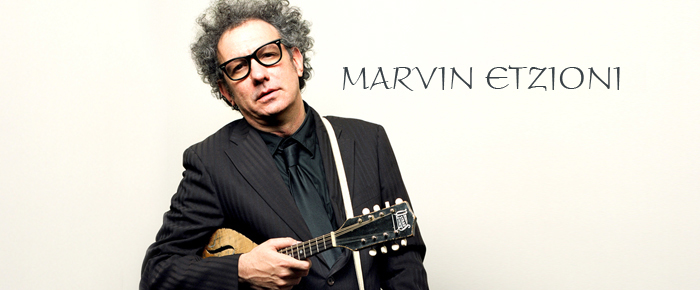
By Eleni P. Austin
If Marvin Etzioni ever decided to pack up and leave Los Angeles, the recording industry based in that city might just have to close up shop. A one man Wrecking Crew, Etzioni is a musical Zelig, having played with everyone who’s anyone.
Born in Brooklyn and raised in L.A., Etzioni displayed an early affinity for music. As a toddler, he’d pick out his favorite 45’s by the color of the label. His beloved zayde, (that’s Yiddish for grandfather), introduced him to Country music as a kid, beginning a life-long obsession.
Throughout high school, he was singing and playing drums in Prudence Goodbody. When the band was denied regular club gigs, they still managed to perform at private parties, libraries and mental hospitals.
By the mid-seventies, Etzioni was fronting a band called Model. They shared stages with other up-and-coming L.A. bands like Plimsouls and the Motels. Separately, producers Chuck Plotkin and Richard Baskin took the band into the studio, but nothing was ever officially released.
In the early ‘80s Los Angeles was a musical melting-pot. The Punk scene was going strong, Hair Metal was just gaining a foot-hold, and bands like the Blasters and Los Lobos were straddling the line between Punk, Blues and Country.
Etzioni was scrambling to play solo gigs when he met a young gun-slinger named Ryan Hedgecock, who shared his affinity for Roots music. When Etzioni rather graciously gave Hedgecock one of his club gigs, he was surprised when Hedgecock’s set included a young singer named Maria McKee. The duo covered Hillbilly classics in sharp, two-part harmonies. Captivated, he encouraged them to write their own songs.
Etzioni wasn’t mentoring the pair for long before they drafted him for bass duties. By adding ex-Emmylou Harris/Hot Band drummer Don Heffington to the mix, suddenly they were a full-fledged band called Lone Justice.
Playing gigs around town, they quickly became local favorites. High-profile fans included Linda Ronstadt, Dolly Parton, Bob Dylan, plus Tom Petty and assorted Heartbreakers.
The buzz surrounding the band was almost deafening. Most of the hype centered on 21-year-old Maria McKee. The half-sister of L.A. Rock legend, Bryan MacLean (from the celebrated Sunset Strip Psych-Folk Rock phenomena, Love), she grew up surrounded by music. McKee had an amazing voice, prompting some to insist she was a Dolly-Emmylou-Linda-Janis Joplin hybrid. She was a potent talent, but who could measure up to those lofty comparisons?
Lone Justice was signed to Geffen Records, powerhouse producer Jimmy Iovine decided to produce and manage the band. Their much anticipated, self-titled debut arrived in 1985.
The first single was a Tom Petty contribution. “Ways To Be Wicked” offered a pithy introduction to the album, which was chockablock with excellent Etzioni songs like the rollicking “East Of Eden” and the psychedelic hoedown “Working Late.”
Iovine’s production was super bombastic, typical of the mid ‘80s, but this music required more finesse. The album was a critical success, and the band were hand-picked to open for U2 on their “Unforgettable Fire” tour. Unfortunately, none of the notoriety translated into album sales.
Although they pre-saged alt.country bands like Uncle Tupelo and Cowboy Junkies, Lone Justice was diagnosed as being too Country for Rock fans and too Rock for a Country audience. Etzioni, Hedgecock and Heffington left the band. McKee recruited more players for an ill-fated follow-up. By 1987 Lone Justice was done.
Having mastered a plethora of string instruments, Etzioni had already begun to make a name for himself as a session player. He worked with the Williams Brothers, (Andy Williams’ Everly-esque twin nephews, Andrew and David) and Victoria Williams (no relation).
David and Marvin co-wrote an immediate classic, “Can’t Cry Hard Enough,” which became his most successful song. It was recorded separately by the Williams Brothers, Marvin and Victoria, Julie Miller, Tom Freund and Judy Collins.
By the early ‘90s, the time seemed right for Marvin Etzioni to concentrate on a solo career. He released three wonderful records in quick succession, Marvin The Mandolin Man, Bone and Weapons Of The Spirit. Each album found a home on radio’s burgeoning AAA (Adult Album Alternative) format.
Etzioni spent the ensuing years recording with a surfeit of Rock & Roll and alt.country all-stars including Lily Haydn, Lisa Loeb, Counting Crows, Dixie Chicks, Lucinda Williams, Bob Dylan, Grey de Lisle, Sam Phillips and the Williams Brothers. He also found time to produce Toad The Wet Sprocket’s album, Pale, and Peter Case’s Sings Like Hell, and has shared the stage with everyone from T-Bone Burnett to Keith Richards and Norah Jones.
Throughout the years, Etzioni was stockpiling his own compositions. He has now gathered them together in a two-CD, 22 song set, aptly titled Marvin Country! The album opens with an ethereal duet with Maria McKee.
“You Possess Me” is awash in swoony pedal-steel guitar. Walking a tightrope between spiritual and sexual salvation, Maria and Marvin’s vocals intertwine, appropriately breathless and urgent as they surrender to a higher power; “I’m not over, I’m under your spell/Am I sober? I’m so in love I can’t Tell.”
A lot of well-known pals are on-hand to split vocal duties with Etzioni. John Doe, front-man for X and a fine solo artist in his own right, pops up on “Grapes Of Wrath.” A ramshackle rhythm and scabrous guitar licks power this raucous tale of romantic revenge; “You broke my heart in half, now it’s time for you to taste the grapes of wrath.”
British Folk legend Richard Thompson shares a songwriting credit and vocals on “It Don’t Cost Much.” Weezy accordions sketch out a melody line that feels like a sideways homage to Johnny Nash’s sunny “I Can See Clearly Now.” The lyrics take pains to consciously uncouple; “If someone stays and someone leaves, you know I would rather be the leaver/I’ll take the pain of being deceived, for the guilt of the deceiver.”
“Living Like A Hobo,” is a shambolic anvil chorus extoling the virtues of a transient life. The tune, featuring Buddy Miller is anchored by squeezebox and jew’s harp, giving it a boinging buoyant appeal.
“Ain’t No Work In Mississippi,” gets two versions. On the first, Etzioni’s warm tones are matched by Steve Earle’s authoritative growl. This take has the primitive sound of a field holler. The slower more contemplative version features ex-Balancing Act front-man Willie Aaron.
As cool as it is to have Etzioni interact with such high profile guests, the most satisfying moments on the album come from his solo songs. “A Man Without A Country” is spare and simple, just vocals, acoustic guitar and porchboard. But the sense of yearning and desolation is devastating.
“Son Of A Carpenter” offers a jangly ode to to his parents’ lineage; “He made the prettiest girl blush, she became his bride/In a matter of months, I was kicking inside.” Meanwhile, “Hard To Build A Home” is a classic C&W weeper. Plangent piano notes cloak Etzioni’s sad-sack philosophizin’ on the heartbreak of a broken home.
Two songs, “There’s A Train” and “God’s Little Mansion” offer sharp dissertations on grief. “…Train” has the forlorn feel of a New Orleans funeral march. Etzioni bids farewell to a loved one, almost weeping as he asserts his fealty. “If you are trying to test my faith, there is no one who can take your place, I shall not be moved.”
“God’s Little Mansion is sweetly philosophical, accented by twinkly mandolin fills. “Before you reach God’s little mansion, open your eyes/’Cause all you have is time and love in this life.”
Three tracks offer slightly smart-ass encomiums to Etzioni’s musical heroes. The acerbic hoedown of “Bob Dylan Is Dead” was originally written back in the ‘80s as a reaction to a particularly snide review of a Dylan record.
“What’s Patsy Cline Doing These Days pts. 1 & 2,” feature Grey deLisle and Jon Wayne. It was inspired by an overheard conversation of an older, somewhat clueless record label executive sincerely wondering “what’s Patsy Cline doing these days,” as he plotted her comeback! The common knowledge that she died in a plane crash in 1963 remains elusive.
“Gram Revisited” combines a sincere narrative with the album’s most idiosyncratic arrangement. A percolating rhythm and rippling acoustic arpeggios play over a looped snippet of Gram Parsons in conversation. Etzioni’s mien is rueful as he yearns for a personal connection with a musical icon. “I never met him in person, somehow I feel like I know him/I wish I could go back in time just to look into his eyes and say goodbye.”
The best tracks on the album, “Lay It On The Table,” and “Where’s Your Analog Spirit” offer a level of intimacy and verisimilitude that is unparalleled. The former is a smoky duet with Lucinda Williams is a vivid and trenchant post-mortem on a moribund marriage. Propelled by a martial cadence, swelling strings, lachrymose pedal steel, mandocello and toy piano, the melody aches with heartbreak.
The latter tune is more quirky, equal parts sardonic and spiritual. In a canny nod to the Byrds, Etzioni addresses his almighty as “Mr. Spaceman.” He questions him at length, decrying man’s inhumanity to man; “There are more prisons than schools, and any poor fool can own a gun/You won’t find no fortunate son on death row, nowhere under the sun.” The warm lullabye melody takes the sting out of this biting social commentary. In the end, Etzioni notes, “only the song will survive.” Amen.
Other interesting tracks include the propulsive “Diamond In The Sky” and the slithery blues of “Trouble Holding Back,” which features a sidewinder guitar solo from Trevor Menear.
Etzioni recasts two classics from his considerable cannon. “You Are The Light” first appeared on Lone Justice’s debut. Here it is reborn as the Gospel hymn it was always meant to be. That transition is facilitated with vocal assists from the venerable Dixie Hummingbirds.
The Williams Brothers first recorded “Miss This World” in 1991, wrapping their feather-light fraternal harmonies around this gorgeous lament. Here Etzioni strips the song to the bone, giving it a stark, rotogravure quality.
The album closes with the tender benediction of “Hold Fast To Your Dreams.” There’s a poignant gravitas to the track, in a bygone era Sinatra might have turned it into one of his blue-eyed saloon songs. But in Etzioni’s hands it’s a slow-burning carpe diem anchored by high-lonesome harmonica.
On Marvin Country!, Etzioni relies on a who’s-who of pickers, players and compadres. Drummers Don Heffington and Donald “The Clock” Lindley, guitarists Gurf Morlix and Duane Jarvis, Greg Leisz on pedal steel, legendary bassist Jerry Scheff and Phil Parl Apiano on squeezebox and accordion. Etzioni produced the record with the invaluable David Vaught. Fittingly, the album is dedicated to the memories of Duane Jarvis and Donald “The Clock” Lindley, who have since passed on, as well as his zayde, Harry Teitelbaum.
Marvin Country! offers a smorgasbord of styles. It’s also a great introduction to a protean talent who has always been here. Find out what you’ve been missing.












































